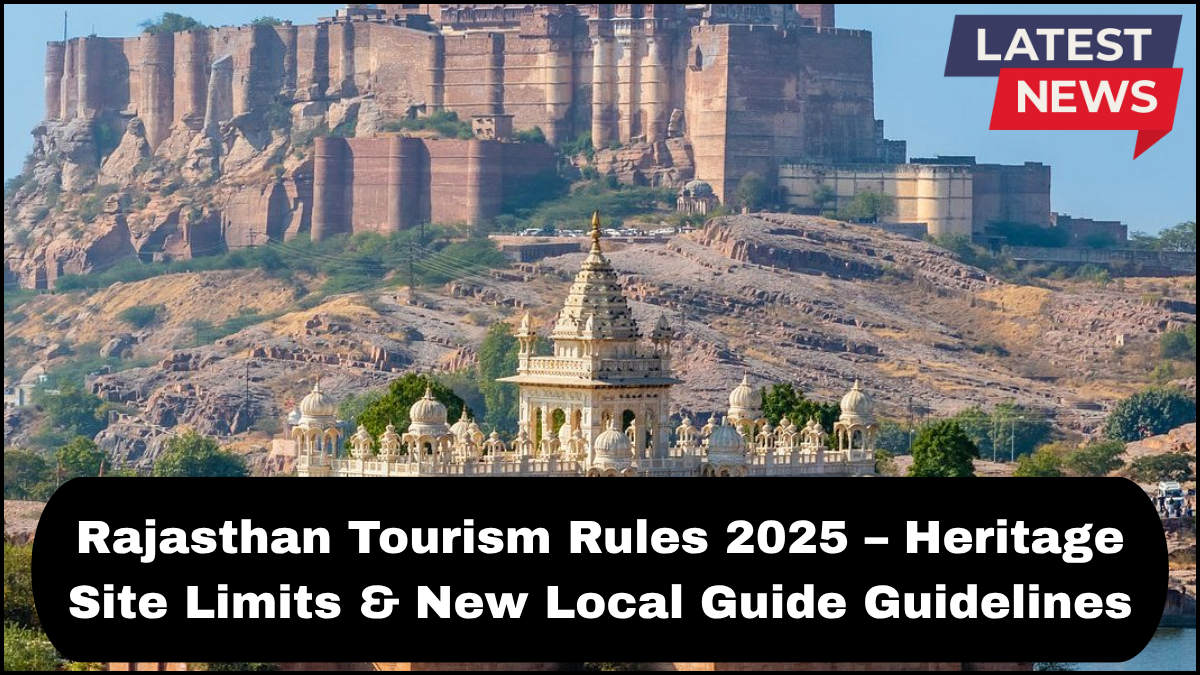Rajasthan, one of India’s most visited cultural and historical destinations, has introduced a sweeping set of reforms under the Rajasthan Tourism Rules 2025. These changes aim to protect the state’s rich heritage while improving the quality of the visitor experience. With growing concerns over overcrowding, cultural preservation, and local livelihood, the state government has issued new directives on heritage site visitor restrictions and revamped policies for local tourist guides.

Stricter Heritage Site Visitor Limits
To preserve its iconic landmarks, the Rajasthan government has imposed daily visitor caps at key heritage sites. This move addresses the long-standing issue of over-tourism, which has strained historic structures and led to safety concerns.
Key changes include:
- Cap on Daily Visitors: Popular sites like Amer Fort, City Palace (Jaipur), Mehrangarh Fort, and Chittorgarh Fort will now admit a fixed number of tourists per day. For instance, Amer Fort is capped at 5,000 visitors daily.
- Advance Online Bookings Mandatory: Visitors must pre-book tickets through the official tourism portal to ensure regulated footfall.
- Peak Hour Access Restrictions: Tourists may face staggered entry schedules to prevent crowd congestion during peak hours.
- Priority for Domestic Tourists and Students: A portion of daily slots is reserved for Indian tourists and educational groups to promote cultural awareness locally.
These heritage site visitor restrictions are not merely regulatory but are a step toward sustainable tourism, ensuring future generations can experience Rajasthan’s grandeur without degradation.
New Guidelines for Local Tourist Guides
The Rajasthan Tourism Rules 2025 also revamp the standards for local tourist guides, emphasizing professionalism, safety, and historical accuracy. The new rules aim to support local employment while enhancing the tourist experience.
Highlights of the updated guide policy:
- Mandatory Licensing and Training: All guides must now undergo a certified training program that covers history, communication skills, first aid, and sustainable tourism practices.
- Local Priority Hiring: Only residents of Rajasthan districts are eligible to apply for guide licenses in their respective heritage zones.
- Uniform and Badge Requirements: Guides must wear designated uniforms and carry visible identification badges to eliminate unregistered operators.
- Real-Time Verification: Tourists can scan QR codes on the guides’ badges to verify their credentials instantly.
- Performance Monitoring System: Feedback from tourists will directly impact a guide’s license renewal, encouraging quality service and accountability.
This approach helps formalize the sector while giving tourists reliable access to knowledgeable, trained professionals who can genuinely enrich their visit.
Technology Integration & Smart Monitoring
To implement these changes efficiently, Rajasthan has rolled out a new Smart Heritage Tourism App. It facilitates bookings, offers digital queue management, and provides real-time visitor updates at major sites. Surveillance systems and AI-powered crowd analytics are also being deployed to monitor tourist flow and ensure compliance with capacity regulations.
Additionally, multilingual audio guides will be introduced for self-guided tours, reducing dependency on unregistered tour operators.
Penalties for Non-Compliance
Strict enforcement accompanies the new rules. Unauthorized guides, counterfeit tickets, and exceeding heritage site limits may lead to heavy fines or blacklisting. Tour operators found flouting these rules could face suspension of their operating licenses.
Sustainable Impact and Local Involvement
The Rajasthan Tourism Rules 2025 reflect a shift toward community-inclusive tourism. Local artisans, performers, and cultural groups will be given dedicated platforms at heritage sites to interact with tourists directly, boosting cultural exchange and rural livelihoods.
Eco-tourism circuits and village stay programs are also being expanded to divert tourist traffic from overcrowded hotspots, spreading the economic benefits more evenly across the state.
FAQs
Q1. When do the Rajasthan Tourism Rules 2025 come into effect?
They are effective from January 1, 2025, with a transition period for guide registration and platform testing.
Q2. Can foreign tourists access all heritage sites under the new rules?
Yes, but they must book in advance and adhere to visitor limits. A portion of tickets is reserved for foreign nationals.
Q3. How can a local resident become a certified tourist guide?
Applicants must register through the Rajasthan Tourism Department portal and complete the required training and examination.
Q4. Are there any exceptions to the visitor cap at heritage sites?
Special permissions may be granted for state functions, research teams, or film crews, but require advance government approval.
Q5. Is there an official app for tourists to book tickets and guides?
Yes, the “Smart Heritage Rajasthan” app supports bookings, site updates, and guide verifications.
click here to learn more